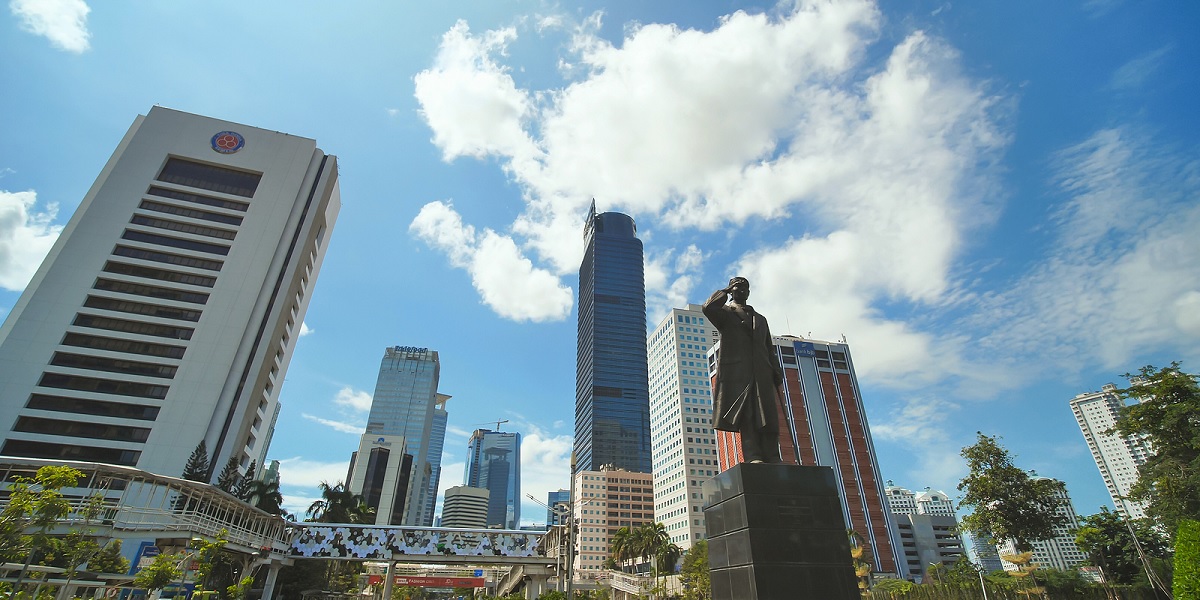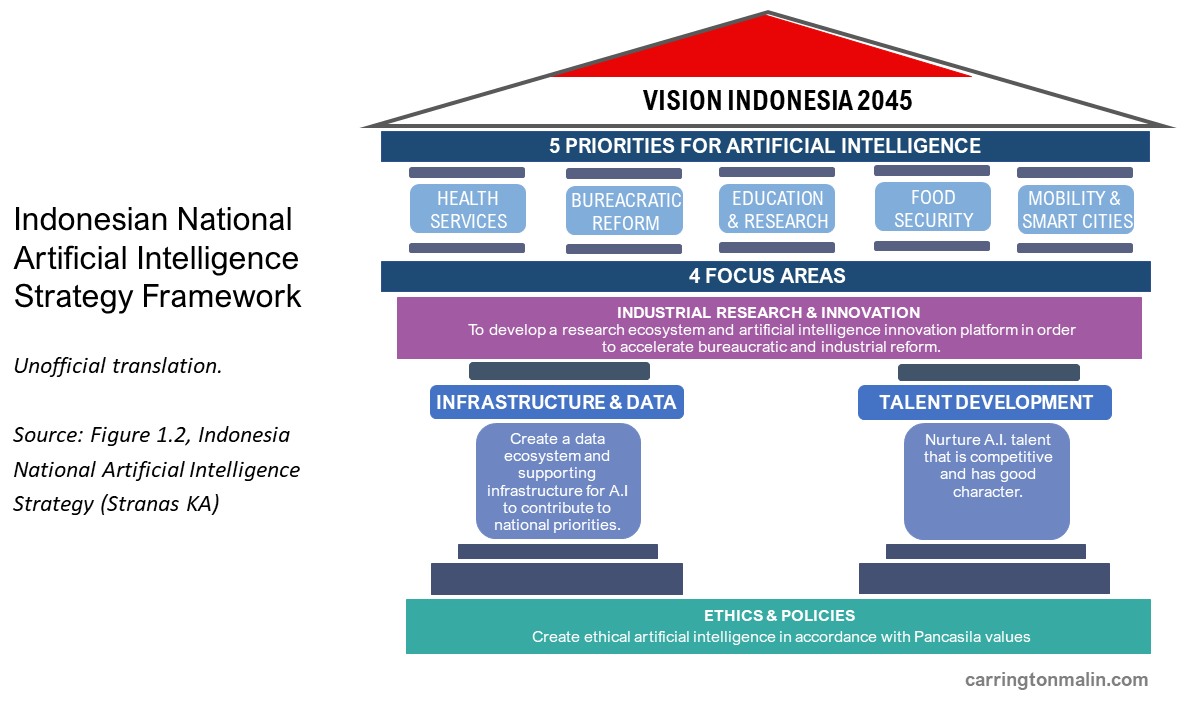The Indonesia National AI Strategy, now known as Stranas K.A. (Strategi Nasional Kecerdasan Artifisial), has been published. The new strategy was announced by the Minister of Research and Technology and head of the BRIN (the National Research and Innovation Agency) Bambang PS Brodjonegoro in an television address made last Monday to mark the country’s 25th National Technology Awakening Day. The minister also launched an electronic innovation catalogue, helping Indonesian technology developers to market their offerings and sell to government procurement offices.
Transforming Indonesia into a Fourth Industrial Revolution economy has become focus for the government over the past few years and the necessity of creating a digital-savvy workforce has become a top priority. Stranas K.A. aims to tie together many of the country’s digital initiatives and maps closely to Visi Indonesia 2045, the country’s broad economic, social, governance and technology development strategy. The National Artificial Intelligence Strategy Framework provides an at-a-glance view of how these different goals are held in context.
Stranas K.A. aims to support five national priorities, where the government believes that artificial intelligence could have the biggest impact on national progress and outcomes.
Health services – With 268 million people living across 6,000 of Indonesia’s total 17,504 islands, delivering a consistent standard of healthcare is a national challenge. The archipelago also faces increased risks from global disease outbreaks such as SARS and, recently, Covid-19. The country’s response to the pandemic has already somewhat accelerated plans for smart hospitals and health security infrastructure.
Bureaucractic reform – With a civilian civil service of about 4 million, reforming the government’s highly centralised administration remains a significant challenge. Indonesia is lagged in implementation of digital services, according to the United Nations E-Government Development Index (EGDI), ranking below Borneo, Malaysia, Singapore, Thailand and Vietnam. President Joko Widodo has promised to create a citizen-centric digitised service government (Pemerintahan Digital Melayani) in the next five years.
Education and research – Education is integral to Visi Indonesia 2045 and the move towards online schooling during the Covid-19 pandemic has laid bare the country’s digital divide. The pressures of the digital economy are also recognised by development plans. According to the government, Indonesia needs a digital workforce of 113 million by 2030-2035.
Food security – According to President Widodo, food security remains Indonesia’s top priority and the Food Security Agency focuses on three main areas: food availability, food accessibility and food utilisation. Food, agriculture and fisheries government departments and agencies have already begun using satellite technology, machine learning and smart farming to better plan, forecast and manage agricultural production and natural resources.
Mobility and smart cities – The number of people living in Indonesia’s urban areas is now close to 60 percent and is expected to rise to 70 percent of the total population by the year 2050. The government currently plans to develop 98 smart cities and 416 smart districts, under Indonesia’s 100 Smart Cities Plan.
Meanwhile, the Indonesia national AI strategy identifies four key focus areas:
-
- Ethics and Policy
- Talent Development
- Infrastructure and Data
- Industrial Research and Innovation
Indonesia is already one of South East Asia’s biggest investors in artificial intelligence, with IDC’s 2018 Asia-Pacific Enterprise Cognitive/AI survey finding that 25 percent of large organisations in the country have adopted AI systems (compared with 17% in Thailand, 10% in Singapore and 8% in Malaysia).
Smart cities, one of Stranas K.A.’s five top priority areas, have been identified as a fundamental building block for Indonesia’s Industry 4.0 future. Last year President Widodo announced plans to create a new futuristic smart city capital on the island of Borneo, to replace Jakarta. The new capital will rely heavily on sustainable smart city systems, cleantech and infrastructure run by emerging technologies such as 5G, AI and IoT (Internet of Things). Originally slated for completion by 2024 (pre-pandemic) and estimated to cost $33 billion, the project reportedly received an offer by Japanese multinational investor SoftBank Group to invest up to $40 billion.
The Indonesia National AI Strategy details a programme roadmap for both its four key focus areas and the five national priorities, for which it considers plans as short-term (2020-2024) and longer-term (2025-2045). All in all, the strategy document identifies 186 programmes, including many that aim to develop the plans, pilot schemes, policies and regulations, plus checks and balances, necessary to drive the overall strategy.
Underpinning the acceleration of Indonesia’s artificial intelligence journey, Stranas K.A. includes plans for national standards, regulations and an ethics board to ensure that usage of AI is in accordance with the country’s Pancasila values system.
The development of the 194-page National Artificial Intelligence Strategy was coordinated by the Agency for the Assessment and Application of Technology or BPPT, a non-ministerial government agency under the coordination of the Ministry for Research and Technology, and was widely anticipated to be announced in July or August. A wide variety of public and private sector organisations contributed to the plan including government ministries, universities, industry associations and national telecom providers.
Although many of the programmes and initiatives detailed in the Indonesia National AI Strategy can be found in existing government strategies, plans and policy, Stranas K.A. is nevertheless highly ambitious. The success of the overall plan will likely rest heavily on how many of the foundation programmes it is able to get off the ground during the next 4-5 years.





